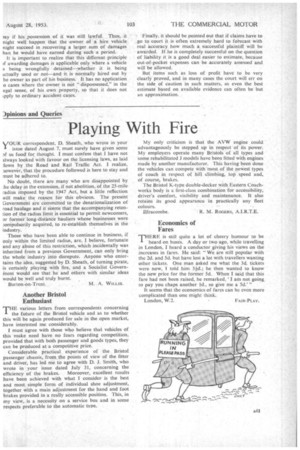Jpinions and Queries
Page 59

If you've noticed an error in this article please click here to report it so we can fix it.
Playing With Fire
%IOU R correspondent, D. Sheath, who wrote in your
issue dated August 7, must surely have given some )f us food for thought. I must confess that I have not tlways looked with favour on the licensing laws, as laid :town .by the Road and Rail Traffic Act. I realize, towever, that the procedure followed is here to stay and must be adhered to.
No doubt, there are many who are disappointed by he delay in the extension, if not abolition, of the 25-mile radius imposed by the 1947 Act, but a little reflection will make the reason for this obvious. The present Government are committed to the denationalization of road haulage and it' Seems that the accompanying retention of the radius limit is essential to permit newcomers, ar former long-distance hauliers whose businesses were :ompulsorily acquired, to re-establish themselves in the industry.
Those who have been able to continue in business, if only within the limited radius, are, I believe, fortunate and any abuse of this restriction, which incidentally was inherited from a previous Government, can only bring the whole industry into disrepute. Anyone who entertains the idea, suggested by D. Sheath, of turning pirate, is certainly playing with fire, and a Socialist Governinent would see that he and others with similar ideas would be well and truly burnt.
Burton-on-Trent. M. A. WILLIS.
Another Bristol Enthusiast
1HE various letters from correspondents concerning the future of the Bristol vehicle and as to whether this will be again produced for sale in the open market, have interested me considerably.
I must agree with those who believe that vehicles of this 'make need have no fears regarding competition, provided that with both passenger and goods types, they can be produced at a competitive price.
Considerable practical experience of the Bristol passenger chassis, from the points of view of the fitter and driver, has led me to agree with D. J. Smith, who wrote in your issue dated July 31, concerning the efficiency of the brakes. Moreover, excellent results have been achieved with what I consider is the best and most simple form of individual shoe adjustment, together with a main adjustment for the hand and foot brakes provided in a really aCcessible position. This, in my view, is a necessity on a service bus and in some respects preferable to the automatic type. My only criticism is that the AVW engine could advantageously be stepped up in respect of its power. My employers operate many Bristols of all types and some rehabilitated J models have been fitted with engines made by another manufacturer. This having been done the vehicles can compete with most of the newest types of coach in respect of hill climbing, top speed and, of course, brakes.
The Bristol K-type double-decker with Eastern Coachworks body is a first-class combination for accessibility, driver's comfort, visibility and maintenance. It also retains its good appearance in practically any fleet colours.
Ilfracombe. R. M. ROGERS, A.I.R.T.E.
Economics of Fares
THERE is still quite a lot of cheery humour to be I heard on buses. A day or two ago, while travelling in London, I heard a conductor giving his views on the increases in fares. He said: "We are still popular with the 2d. and 5d. but have lost a lot with travellers wanting other tickets. One man asked me what the 3d. tickets were now, I told him 3i,d.; he then wanted to know the new price for the former 5d. When I said that this fare had not been raised, he remarked, ' I am not going to pay you chaps another Id., so give me a 5d.'" It seems that the economics of fares can be even more complicated than one might think.
London, W.2. FAIR-PLAY.




















































































